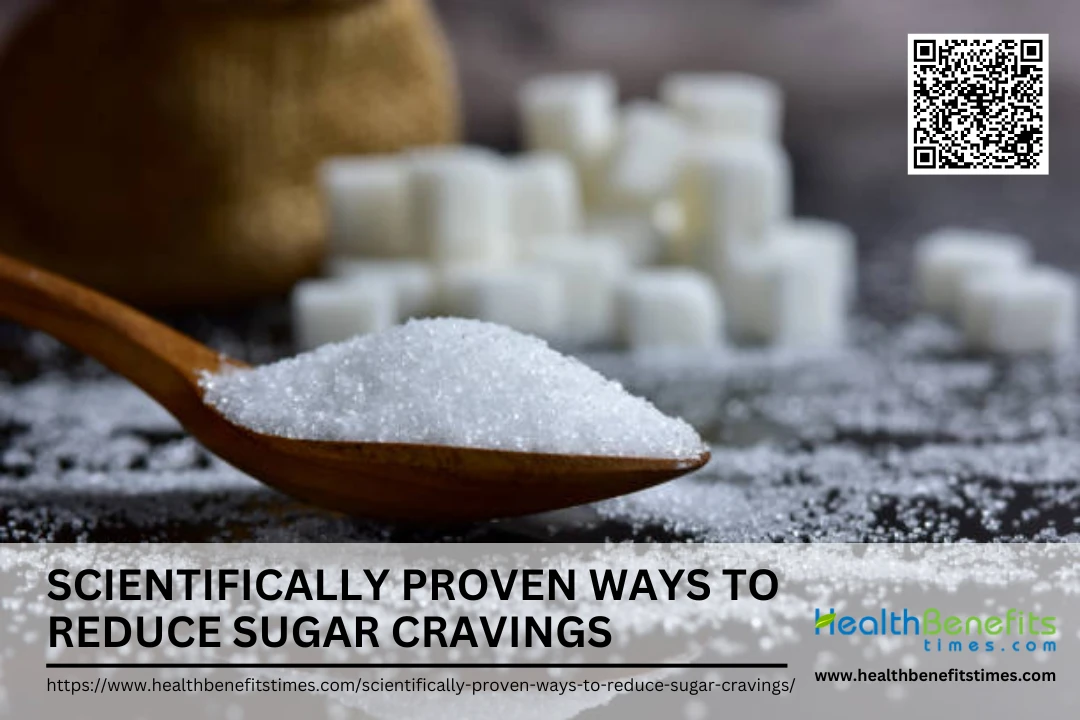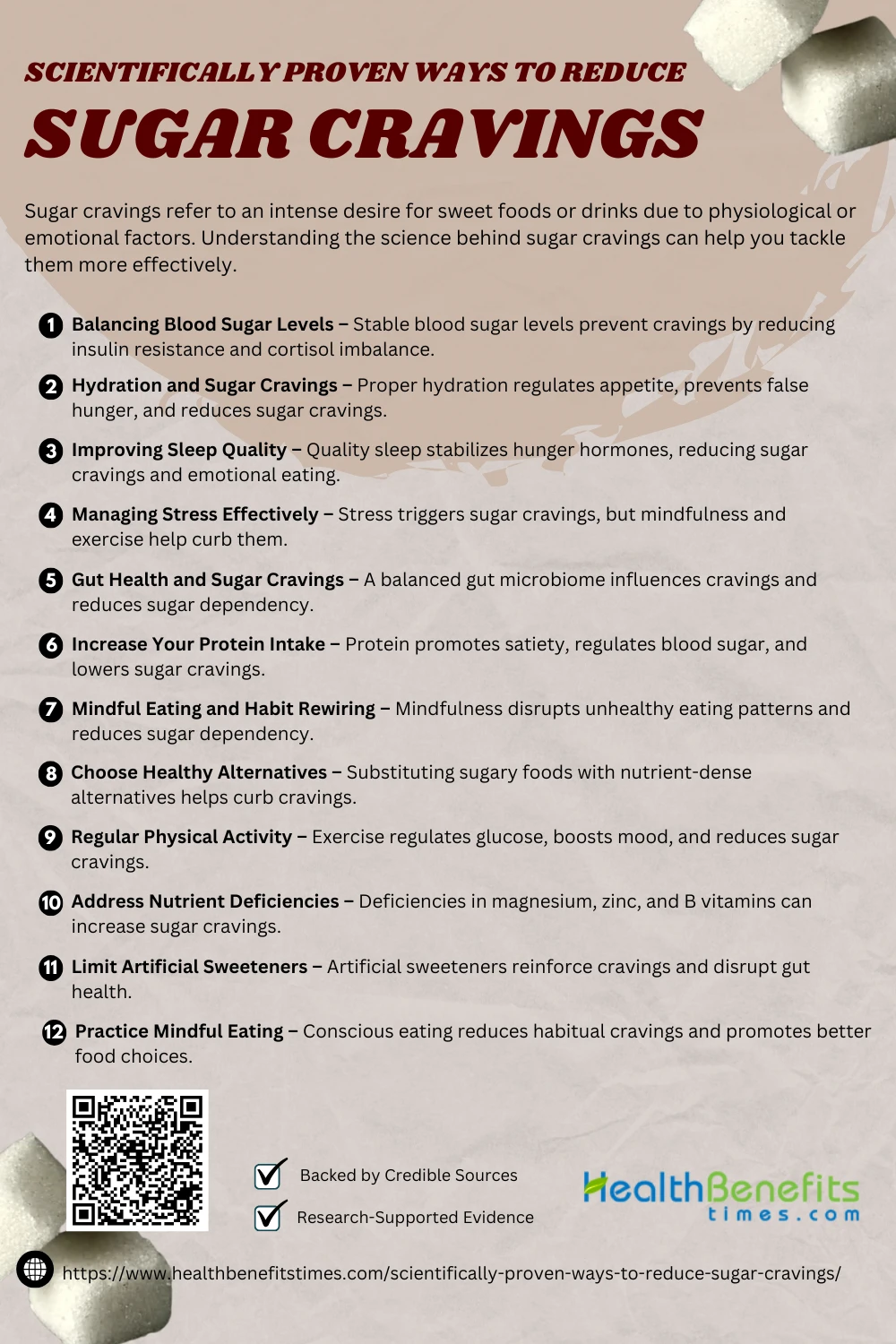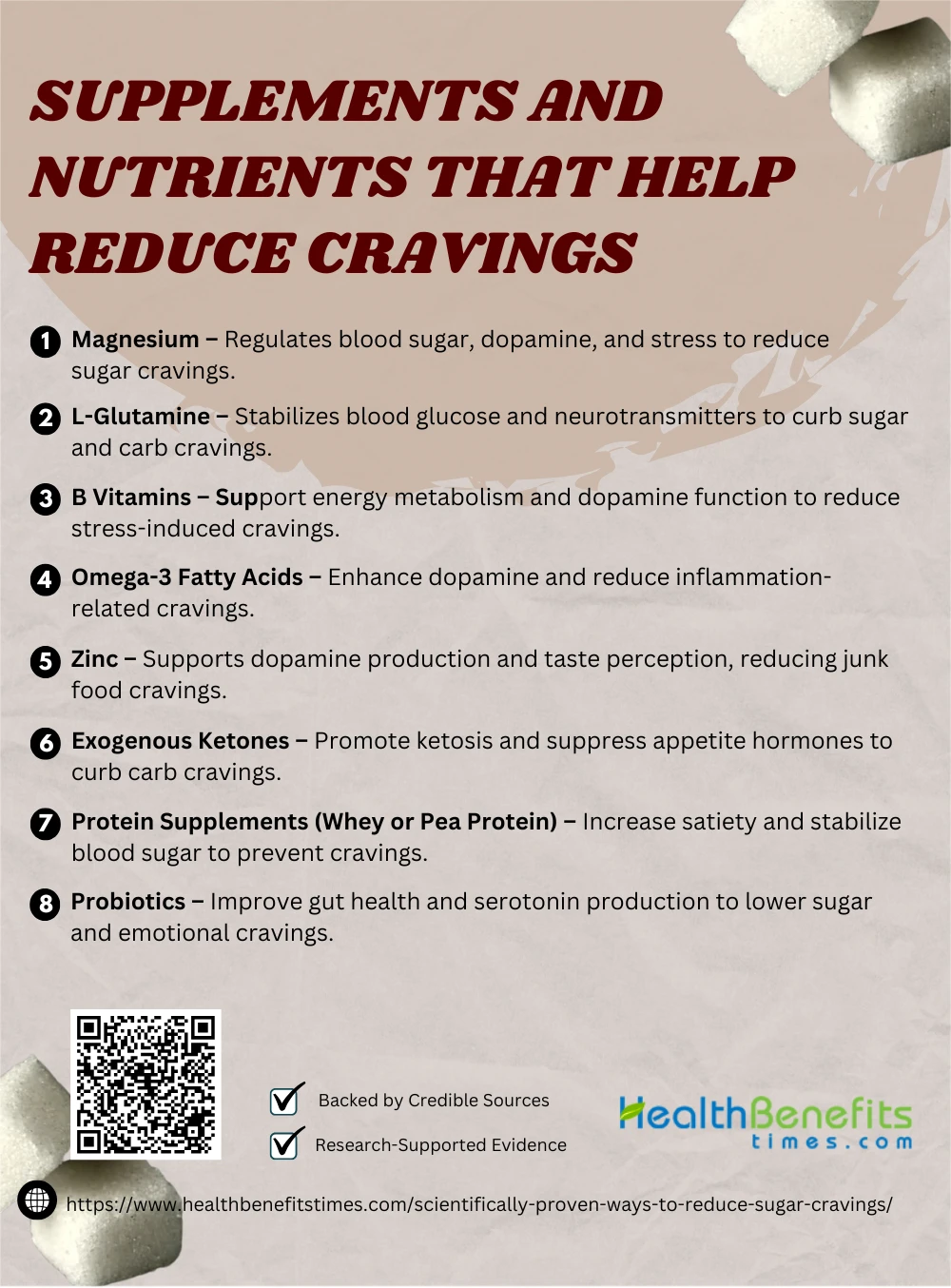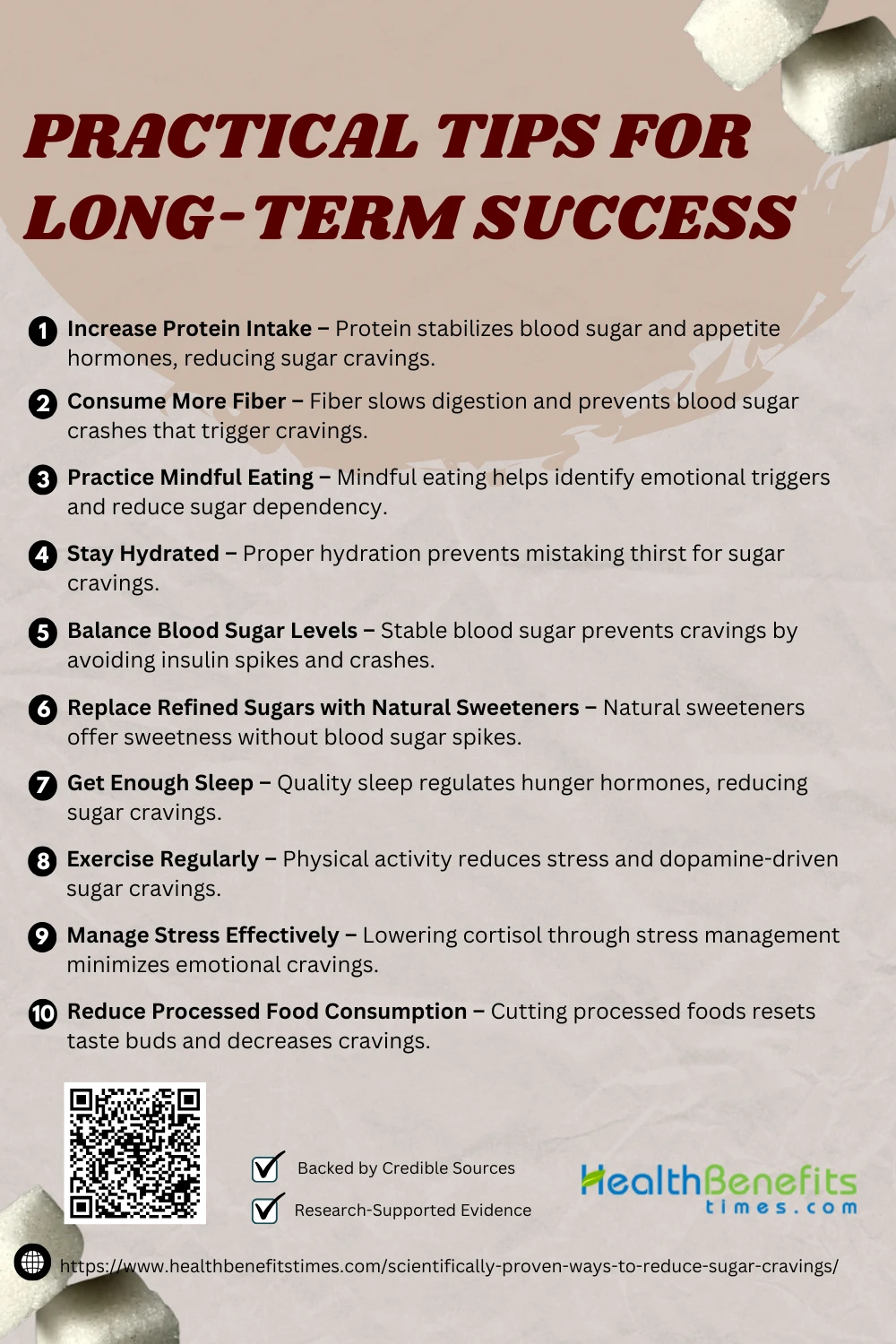- Sugar cravings refer to an intense desire for sweet foods or drinks due to physiological or emotional factors.
- Understanding the science behind sugar cravings can help you tackle them more effectively.
- Implementing proven strategies, such as managing blood sugar levels and incorporating healthier alternatives, can significantly reduce cravings.
 Sugar cravings refer to an intense and persistent desire to consume sugary foods, often triggered by fluctuations in blood sugar levels, stress, or habitual consumption of processed foods. Sugar cravings are a common challenge, driven by biological, psychological, and environmental factors. Research shows that excessive sugar consumption can lead to addiction-like responses in the brain, reinforcing the cycle of cravings and overconsumption. One of the primary causes of sugar cravings is the rapid rise and fall of blood sugar levels, which triggers the release of insulin and subsequently leads to hunger and cravings for more sugar. Studies have also linked sugar cravings to an imbalance in gut microbiota, as certain bacteria thrive on sugar and influence cravings. Additionally, psychological factors, such as stress and emotional eating, contribute significantly to the desire for sweet foods, as sugar consumption temporarily boosts dopamine and serotonin levels.
Sugar cravings refer to an intense and persistent desire to consume sugary foods, often triggered by fluctuations in blood sugar levels, stress, or habitual consumption of processed foods. Sugar cravings are a common challenge, driven by biological, psychological, and environmental factors. Research shows that excessive sugar consumption can lead to addiction-like responses in the brain, reinforcing the cycle of cravings and overconsumption. One of the primary causes of sugar cravings is the rapid rise and fall of blood sugar levels, which triggers the release of insulin and subsequently leads to hunger and cravings for more sugar. Studies have also linked sugar cravings to an imbalance in gut microbiota, as certain bacteria thrive on sugar and influence cravings. Additionally, psychological factors, such as stress and emotional eating, contribute significantly to the desire for sweet foods, as sugar consumption temporarily boosts dopamine and serotonin levels.
Fortunately, scientific research has identified multiple effective strategies to reduce sugar cravings. Incorporating more protein and fiber into the diet helps stabilize blood sugar and reduce hunger signals. Staying hydrated and ensuring adequate sleep are also crucial, as dehydration and sleep deprivation have been shown to increase cravings for high-calorie foods. Regular physical activity plays a key role in balancing hormones and neurotransmitters that regulate appetite and cravings. Additionally, mindfulness-based interventions, such as cognitive behavioral therapy (CBT) and mindful eating techniques, have been proven to help individuals manage and reduce their cravings effectively.
Understanding Sugar Cravings
Sugar cravings are influenced by a combination of biological and psychological factors. One key cause is the brain’s reward system, where sugar stimulates dopamine release, reinforcing repeated consumption. Additionally, fluctuations in blood sugar levels and hormonal imbalances contribute to cravings, particularly in individuals with metabolic disorders. (1) Over time, excessive sugar intake leads to dependency and metabolic disruptions, increasing the risk of obesity, diabetes, and systemic inflammation.
Scientifically Proven Strategies to Reduce Sugar Cravings
Sugar cravings stem from hormonal imbalances, stress, and nutrient deficiencies. Scientifically proven strategies like balanced nutrition, hydration, sleep, and mindful eating can help curb cravings and promote healthier eating habits.
1. Balancing Blood Sugar Levels
Maintaining stable blood sugar levels is essential for curbing sugar cravings. Diets rich in protein and healthy fats help prevent blood sugar spikes, reducing hunger and cravings. (2) Protein shakes have also been shown to regulate blood glucose and limit sweet cravings. (3) Additionally, cortisol balance plays a role in blood sugar regulation, impacting cravings. (4) Insulin resistance can lead to heightened cravings, making blood sugar control crucial. (5) Implementing a low-glycemic diet further stabilizes glucose levels and reduces sugar dependency. (6)
2. Hydration and Sugar Cravings
Staying hydrated is a crucial yet often overlooked strategy for reducing sugar cravings. Dehydration can mimic hunger, leading to increased sugar consumption. (2) Research suggests that proper hydration reduces cravings by regulating appetite and metabolism. (7) Drinking water before meals has been shown to decrease calorie intake and prevent unnecessary snacking. (8) Furthermore, replacing sugary beverages with water significantly lowers sugar cravings and improves overall dietary habits. (9) A well-hydrated body supports hormonal balance, which helps in regulating sugar intake and reducing cravings. (10)
3. Improving Sleep Quality
Poor sleep disrupts hunger-regulating hormones, increasing sugar cravings. Studies show that sleep deprivation heightens ghrelin levels, which stimulate hunger, and lowers leptin, which suppresses appetite. (11) Sleep improvement leads to better glucose metabolism, reducing cravings for sugary foods. (12) Consistent, high-quality sleep stabilizes mood and stress levels, mitigating emotional eating. ({% https://journals.lww.com/md-journal/fulltext/2024/05030/liraglutide_associated_depression_in_a_patient.22.aspx?context=latestarticles https://journals.lww.com/md-journal/fulltext/2024/05030/liraglutide_associated_depression_in_a_patient.22.aspx?context=latestarticles trusted %}) Sleep-enhancing strategies like meditation and reduced screen time have been linked to lower sugar consumption. (4) Prioritizing a regular sleep schedule is a natural way to control sugar cravings effectively. (13)
4. Managing Stress Effectively
Chronic stress triggers cortisol release, which increases sugar cravings as the body seeks quick energy sources. (1) High-stress levels correlate with emotional eating and preference for sugary foods. (4) Studies suggest mindfulness and relaxation techniques significantly reduce stress-induced cravings. (13) Regular physical activity improves resilience to stress, lowering cravings for high-sugar foods. (14) Engaging in stress management techniques like deep breathing and meditation is proven to curb sugar cravings effectively. (15)
5. Gut Health and Sugar Cravings
Gut health plays a crucial role in sugar cravings, as an imbalance in gut microbiota can increase the desire for sugary foods. Research shows that gut bacteria influence neurotransmitters like dopamine, affecting cravings. (1) A balanced diet rich in fiber and probiotics supports gut health, reducing sugar dependency. (11) Early gut health interventions can lower sugar addiction risk. (16) Apple cider vinegar has been found to improve gut bacteria and reduce cravings. (17) Overall, a well-balanced gut microbiome is essential for curbing sugar cravings naturally.
6. Increase Your Protein Intake
Protein consumption helps regulate blood sugar levels and reduce cravings by promoting satiety. Studies indicate that a high-protein diet lowers sugar intake and improves weight management. (18) Snacking on protein-rich foods like almonds has been shown to decrease cravings. (19) Increased protein intake supports dopamine regulation, reducing addiction-like sugar cravings. (20) The amino acids in protein aid in balancing brain chemicals that influence food cravings. Incorporating more protein in meals is an effective strategy for stabilizing energy levels and minimizing sugar dependence.
7. Mindful Eating and Habit Rewiring
Mindful eating and habit rewiring are proven strategies to reduce sugar cravings by addressing both biological and psychological triggers. Research shows that mindful eating practices, such as savoring food and recognizing hunger cues, can disrupt automatic eating patterns and reduce emotional eating. (21), (22) Additionally, habit rewiring through mindfulness training helps individuals reassociate unhealthy foods with reduced reward value, leading to healthier choices. (23) , (61) Studies also highlight the role of balanced meals, hydration, and stress management in curbing cravings. (25), (26)
8. Choose Healthy Alternatives
Choosing healthy alternatives is a proven strategy to reduce sugar cravings by stabilizing blood sugar and satisfying sweet preferences naturally. Substituting sugary snacks with fiber-rich fruits like berries or apples slows glucose absorption, curbing energy crashes, (27), (28) Opting for dark chocolate (70%+ cocoa) provides antioxidants while minimizing added sugars. (29), (30) Protein-rich options such as Greek yogurt or nuts enhance satiety, reducing impulsive cravings. (31), (32) Swapping soda for herbal tea or infused water eliminates hidden sugars while hydrating effectively. (33), (34) Gradual shifts, rather than restrictive diets, foster sustainable habits by aligning with the body’s nutritional needs. (35)
9. Regular Physical Activity
Engaging in regular physical activity has been shown to reduce sugar cravings by modulating brain chemistry and stress levels. Exercise releases endorphins and dopamine, which mimic the pleasure response triggered by sugar consumption, leading to fewer cravings. (13) Additionally, physical exertion can help regulate blood glucose levels, reducing the likelihood of sudden energy crashes that drive sugar cravings. (36) Studies also indicate that exercise reduces stress-induced cravings, a key factor in sugar dependency. (13) Furthermore, consistent aerobic workouts can lower the body’s preference for high-glycemic foods, reinforcing healthier eating habits. (36) Finally, movement-based interventions, such as yoga and mindful exercise, have been found to curb emotional eating and sugar cravings effectively. (13)
10. Address Nutrient Deficiencies
Deficiencies in key micronutrients, such as magnesium, zinc, and B vitamins, can contribute to increased sugar cravings due to their role in glucose metabolism and neurotransmitter balance. Studies show that individuals with low magnesium levels experience stronger sugar cravings as the body seeks quick energy sources. (14) Similarly, zinc deficiency has been linked to dopamine imbalance, a neurotransmitter essential for reward processing and craving control. (14) Chromium supplementation has been shown to enhance insulin sensitivity, reducing blood sugar fluctuations and subsequent cravings. (14) Additionally, B vitamins play a critical role in energy metabolism, preventing sugar dependency as a quick energy fix. (14) Ensuring a nutrient-dense diet with adequate protein and fiber can help balance cravings and reduce excessive sugar intake. (14)
11. Limit Artificial Sweeteners
Reducing artificial sweetener intake can significantly help in curbing sugar cravings, as these substitutes often reinforce the desire for sweetness rather than eliminating it. (37) Research suggests that consuming artificial sweeteners, such as aspartame and sucralose, can disrupt appetite regulation and increase cravings for high-calorie foods. Additionally, sweetener consumption has been linked to altered gut microbiota, which may further contribute to sugar dependence. (37) Studies also indicate that people who frequently consume artificial sweeteners experience higher reward activation for sugary foods, making them harder to resist. By reducing reliance on sugar substitutes, individuals can train their taste preferences towards natural, less-sweet foods, ultimately lowering sugar cravings. (37)
12. Practice Mindful Eating
Mindful eating can be an effective strategy in reducing sugar cravings by fostering greater awareness of hunger cues and emotional eating triggers. (38) Research indicates that conscious eating practices reduce the frequency and intensity of sugar cravings by breaking habitual eating patterns. (39) Studies also highlight that individuals who engage in mindfulness-based interventions experience lower consumption of high-sugar foods and show improved blood glucose regulation. (40) Additionally, mindfulness training has been shown to decrease the activation of reward-related brain regions in response to sweet foods. (41) By practicing mindful awareness during meals, individuals can develop better control over cravings and cultivate a healthier relationship with food. (42)
Supplements and Nutrients That Help Reduce Cravings
Cravings, particularly for sugar and unhealthy foods, can often be managed through the right nutrients and supplements. Research highlights several key vitamins, minerals, and compounds that regulate appetite, blood sugar levels, and neurotransmitter function. Below is a listicle of evidence-based nutrients and supplements that can help curb cravings:
1. Magnesium
Magnesium plays a crucial role in regulating blood sugar levels and dopamine function, helping to reduce cravings for sugar and processed foods. (43) Studies suggest that 300 mg of magnesium supplementation daily can significantly reduce cravings by improving neuromodulation. (44) Additionally, magnesium enhances mood stability and reduces stress-induced cravings, supporting better appetite control. (45)
2. L-Glutamine
L-Glutamine plays a vital role in stabilizing blood sugar levels, reducing sugar and carbohydrate cravings by preventing sudden glucose dips. (46) Research shows that it enhances neurotransmitter balance, helping regulate dopamine levels linked to cravings. (47) Additionally, L-Glutamine supplementation has been linked to reduced stress-related cravings, particularly for alcohol and sweets. (48)
3. B Vitamins
B vitamins support energy metabolism and neurotransmitter function, reducing cravings for sugar and refined carbohydrates. (49) Research suggests that B-vitamin supplementation improves dopamine regulation, reducing stress-induced cravings. (50) Additionally, adequate B-vitamin intake has been associated with lower emotional eating tendencies, contributing to better appetite control. (51)
4. Omega-3 Fatty Acids
Omega-3 fatty acids enhance dopamine function, reducing cravings for high-sugar and processed foods. (52) Studies indicate that omega-3s reduce inflammation, which can decrease stress-related cravings. (53) Additionally, omega-3 supplementation has been linked to better appetite regulation, particularly in individuals prone to emotional eating. (54)
5. Zinc
Zinc supports dopamine production, reducing food cravings linked to stress and emotional eating. (55) Research suggests that zinc deficiency can trigger sugar and junk food cravings, making supplementation beneficial for appetite control. (55) Additionally, zinc improves taste perception, reducing the tendency to seek highly palatable, sugary foods. (55)
6. Exogenous Ketones
Exogenous ketones help reduce cravings for carbohydrates and sugar by promoting ketosis, which stabilizes blood glucose levels. (56) Studies suggest they suppress appetite hormones, leading to a natural reduction in food cravings. (56) Additionally, they enhance energy metabolism, reducing dependency on quick-fix, high-sugar foods. (56)
7. Protein Supplements (Whey or Pea Protein)
Protein supplements aid in curbing cravings by increasing satiety hormones, reducing the urge to snack on sugary foods. (57) Research indicates that high-protein intake regulates blood sugar levels, preventing energy crashes that trigger cravings. (58) Additionally, whey and plant-based proteins support dopamine production, improving appetite control. (59)
8. Probiotics
Probiotics enhance gut microbiota balance, reducing sugar and junk food cravings by regulating appetite hormones. (60) Studies show that gut dysbiosis can lead to increased cravings for high-calorie foods, making probiotic supplementation beneficial. (60) Additionally, probiotics support serotonin production, helping to reduce emotional and stress-related cravings. (60)
Practical Tips for Long-Term Success
Reducing sugar cravings for the long term requires a multi-faceted approach that includes dietary adjustments, lifestyle changes, and behavioral strategies. Scientific research shows that addressing both physiological and psychological triggers can lead to sustainable success. Below is a detailed breakdown of effective and evidence-backed strategies to reduce sugar cravings.
1. Increase Protein Intake
Protein helps keep you fuller for longer by regulating appetite hormones like ghrelin and leptin. It slows digestion and stabilizes blood sugar levels, preventing the rapid spikes and crashes that lead to sugar cravings. Research shows that people who consume high-protein meals experience fewer cravings and are less likely to overeat sugary foods.
2. Consume More Fiber
Fiber plays a crucial role in slowing digestion and promoting a steady release of glucose into the bloodstream. This helps avoid blood sugar crashes that lead to cravings for quick-energy sources like sweets and refined carbohydrates. Studies indicate that a fiber-rich diet reduces cravings and overall sugar intake.
3. Practice Mindful Eating
Many people experience emotional sugar cravings due to stress, boredom, or habit rather than actual hunger. Mindful eating helps individuals become more aware of their eating patterns and triggers. Research shows that those who practice mindfulness techniques experience a significant reduction in cravings and emotional eating habits.
4. Stay Hydrated
Dehydration can sometimes masquerade as hunger or sugar cravings. Many people misinterpret thirst signals as a need for a quick-energy boost, often reaching for sugary foods. Research highlights that adequate water intake helps reduce unnecessary snacking.
5. Balance Blood Sugar Levels
Unstable blood sugar levels are one of the primary drivers of sugar cravings. Consuming complex carbohydrates with healthy fats and proteins can prevent blood sugar spikes and crashes, making it easier to control cravings.
6. Replace Refined Sugars with Natural Sweeteners
Refined sugars cause dopamine spikes, leading to sugar dependency over time. Natural sweeteners like stevia, monk fruit, or dates can provide sweetness without the drastic insulin response of refined sugar.
7. Get Enough Sleep
Sleep deprivation disrupts hunger-regulating hormones, increasing cravings for high-sugar, high-fat foods. Lack of sleep leads to a decrease in leptin (the satiety hormone) and an increase in ghrelin (the hunger hormone), making sugar cravings harder to resist.
8. Exercise Regularly
Regular exercise reduces stress, improves dopamine regulation, and enhances mood, which can help minimize sugar cravings. Aerobic exercises like running, cycling, and swimming trigger the release of endorphins, which reduce the urge to seek sugar-induced pleasure.
9. Manage Stress Effectively
High stress increases cortisol levels, which stimulates cravings for quick-energy foods like sugar and processed carbs. Managing stress through meditation, deep breathing, or journaling can significantly reduce emotional cravings.
10. Reduce Processed Food Consumption
Processed foods are designed to be hyper-palatable, meaning they are engineered to stimulate cravings and make it hard to stop eating. Cutting back on ultra-processed foods allows your taste buds to reset, making natural foods taste sweeter over time.
Conclusion
In conclusion, reducing sugar cravings involves understanding their root causes and applying scientifically backed strategies, such as balancing blood sugar levels, managing stress, and choosing healthier alternatives. By adopting these methods consistently, you can regain control over your cravings, leading to improved overall health and well-being. With patience and dedication, long-term success in curbing sugar cravings is achievable.





